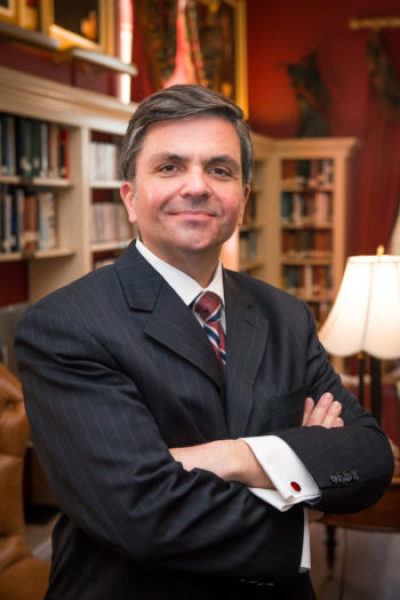Protestant modernism’s end

The death of Episcopal Bishop John Shelby Spong, who gained prominence by rejecting supernatural Christianity, perhaps marks the symbolic end of Protestant modernism. His New York Times obituary is fair and compressive, noting he won accolades for touting LGBTQ inclusion, and many critics for rejecting traditional Christian beliefs about the Virgin Birth and bodily Resurrection. His Newark Diocese plunged in membership under his reign even as he took to national television talk shows claiming he was saving Christianity from “fundamentalism.”
Spong did not engage with his targets; he sneered at them with contempt. As the Times noted, he offered a rare apology after denouncing African Christians as primitives for not heeding his strict rationalism. Spong was a proud son of the Enlightenment and insisted that science had made traditional Christianity irrelevant.
He was the proud champion of 19th century German higher criticism, which saw the Bible as an unruly garden to be pruned of its supernatural weeds. What did the authors really, really, really, really mean? The discovered answer was always very different from what the church had historically understood. Spong’s views represented conventional opinion at elite liberal Mainline Protestant seminaries for most of the 20th century, maybe until the 1970s.
Ironically, Spong launched his crusade after Protestant modernism had already begun its long retreat, about which he was evidently steadfastly unaware. His 1991 book, Rescuing the Bible from Fundamentalism: A Bishop Rethinks the Meaning of Scripture, was about 30 years too late. He later joined the Jesus Seminar to echo its scholars who voted at highly publicized meetings on which scriptures to reject as false. Founded by Robert Funk in 1985, the Jesus Seminar was itself the last gasp of Protestant modernism, widely covered by media not yet aware of the movement’s retreat. The Jesus Seminar, which still sort of exists online, mostly ended with its founder’s 2005 death. It really had nothing more to say, but Spong pushed on, typically addressing elderly audiences, largely comprised of retired Mainline clergy.
In the 1990s I heard Spong speak at Foundry United Methodist Church, where he denounced the Christmas story of Wise Men, singing angels and a wondrous star as a fable. An audience member, decades younger than Spong, identified himself as a gay man and Jewish convert to Christianity who very much believed in the Christmas miracles. Spong replied scoffingly. He had no use for such fantasists. But he did not realize that this encounter signified his crusade against the supernatural was already defeated.
Postmodernity, unlike modernity’s focus on rationalism and science, believes in the power of personal stories. It’s uncomfortable with objective truth but is fine with miracles and supernatural events. The Silent Generation, of which Spong was a part, was the last torchbearers for Protestant modernism. Clergy modernists were typically discrete about telling their congregations what they did not believe about the Bible and church creeds. So they mostly stayed vague and spoke in metaphor. Spong’s host at Foundry Church, Philip Wogaman, was a modernist seminary professor who once wrote an article in a Methodist clergy magazine urging pastors to be more candid. He wrote it while still in academia and likely ignored his own advice when in the pastorate.
It was widely believed 30 years ago that Mainline Protestant clergy were becoming more conservative because seminary graduates of the 1980s forward were no longer modernists and preferred the “thick” narrative of Christian orthodoxy. This impression was true but failed fully to factor in the postmodernism of these seminary graduates. They did believe in the supernatural, in the virgin birth and bodily resurrection, in Christ’s deity, even in angels and demons, and in an afterlife that might include Heaven and Hell. But they were leery of absolute truth claims. They might prefer a certain narrative of Christian orthodoxy, which Spong would denounce as “fundamentalist.” But they would not assert their universal claims.
So these younger clergy of the last 30 years don’t read Spong or care about the Jesus Seminar. But neither are they reversing the 60-year decline of their denominations. As postmodernists, they don’t believe in evangelism. As believers in the primacy of personal stories, they have succumbed to compulsive identity politics around gender, race, and sexuality. They believe in social justice but not in Christian anthropology. Their insistence on the fluidity of gender might have confused Spong, the man of science and rationality who rejected self-narrated fables.
From the social media reactions, it appears some Baby Boomer Protestant liberals and even a few who are younger appreciated Spong for his early championing of gay causes in the Episcopal Church and for his critique of racial segregation in the old South. They appreciate that he despised and provoked the wrath of religious conservatives. But very few have celebrated Spong for his holistic rejection of supernatural Christianity. They are postmodernists. He was a modernist from a different era.
Spong insisted Christianity must reject the supernatural or die. But his own modernist school of thought has mostly died. Even Protestant liberalism has moved on. And “fundamentalism” as he would define orthodox Christianity is surging globally among people and cultures he would deem primitive.
Originally published at Juicy Ecumenism.
Mark Tooley became president of the Institute on Religion and Democracy (IRD) in 2009. He joined IRD in 1994 to found its United Methodist committee (UMAction). He is also editor of IRD’s foreign policy and national security journal, Providence.




















